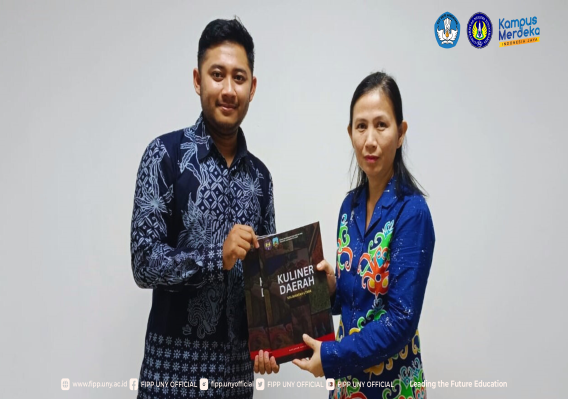Collaboration to Preserve Dayak Culinary Traditions
Submitted by admin on Mon, 12/23/2024 - 19:08


A collaboration between the Universitas Negeri Yogyakarta (UNY) and the Education and Culture Office of North Kalimantan Province has resulted in the publication of a book highlighting the unique culinary traditions of the Dayak community. The book is an outcome of extensive ethnographic research aimed at documenting and preserving the culinary heritage of the Dayak people, which holds a significant place in their cultural identity.
The official handover ceremony for the book took place on December 19, 2024, marking a shared commitment between academic institutions and regional governments to safeguard local cultural treasures. This project underscores the importance of synergy between higher education and local authorities in fostering cultural preservation and unlocking regional potential.
The research team, led by Prof. Dr. Nurtanio Agus Purwanto, M.Pd., included multidisciplinary experts such as Dr. Siti Rohmah Nurhayati, M.Si., Dr. Firmansyah, M.Pd., Dr. Fery Muhamad Firdaus, M.Pd., and Akhmad Rofiq, M.Pd. Beyond culinary aspects, their research delved into the social, environmental, and cultural contexts underpinning the Dayak culinary traditions, ensuring a holistic and invaluable documentation process.
This culinary book is expected to serve as an essential reference for preserving local wisdom while inspiring younger generations to explore and maintain ancestral heritage. Additionally, it opens opportunities for developing culture-based products with economic value for the communities in North Kalimantan.
“Preserving local culture is not just the duty of academics but a shared responsibility for all of us as a nation,” emphasized Dr. Siti Rohmah Nurhayati, a member of the research team. This initiative is seen as the first step in a series of projects focusing on local wisdom development across various regions.
The collaboration highlights how the partnership between academia and government can produce outcomes that are culturally significant and economically and socially relevant. The initiative aims to ensure that the book becomes more than just a static documentation but an active tool that engages communities, especially the younger generation, in integrating culinary traditions into daily life.
It is hoped that this synergy will further strengthen ties between academic institutions and regional governments, resulting in more programs that support cultural preservation while creating tangible benefits for local communities.
Category:
Research






